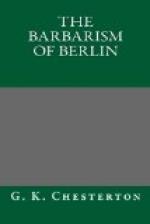These sincere and high-minded peace-lovers are always telling us that citizens no longer settle their quarrels by private violence; and that nations should no longer settle theirs by public violence. They are always telling us that we no longer fight duels; and need not wage wars. In short, they perpetually base their peace proposals on the fact that an ordinary citizen no longer avenges himself with an axe. But how is he prevented from revenging himself with an axe? If he hits his neighbour on the head with the kitchen chopper, what do we do? Do we all join hands, like children playing Mulberry Bush, and say, “We are all responsible for this; but let us hope it will not spread. Let us hope for the happy day when we shall leave off chopping at the man’s head; and when nobody shall ever chop anything for ever and ever.” Do we say, “Let bygones be bygones; why go back to all the dull details with which the business began; who can tell with what sinister motives the man was standing there, within reach of the hatchet?” We do not. We keep the peace in private life by asking for the facts of provocation, and the proper object of punishment. We do go into the dull details; we do enquire into the origins; we do emphatically enquire who it was that hit first. In short, we do what I have done very briefly in this place.
Given this, it is indeed true that behind these facts there are truths; truths of a terrible, of a spiritual sort. In mere fact, the Germanic power has been wrong about Servia, wrong about Russia, wrong about Belgium, wrong about England, wrong about Italy. But there was a reason for its being wrong everywhere; and of that root reason, which has moved half the world against it, I shall speak later in this series. For that is something too omnipresent to be proved, too indisputable to be helped by detail. It is nothing less than the locating, after more than a hundred years of recriminations and wrong explanations, of the modern European evil; the finding of the fountain from which poison has flowed upon all the nations of the earth.
I
THE WAR ON THE WORD
It will hardly be denied that there is one lingering doubt in many, who recognise unavoidable self-defence in the instant parry of the English sword, and who have no great love for the sweeping sabre of Sadowa and Sedan. That doubt is the doubt whether Russia, as compared with Prussia, is sufficiently decent and democratic to be the ally of liberal and civilised powers. I take first, therefore, this matter of civilisation.




